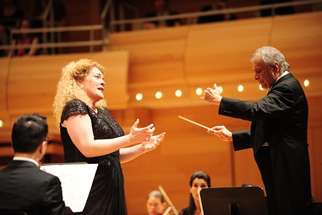|
Back
Mehta Brings Mahler’s 3rd to Montreal Gala Montreal
Maison symphonique de Montréal
05/19/2015 -
Gustav Mahler: Symphony No. 3 in D minor
Michelle DeYoung (mezzo-soprano)
Chœur des enfants de Montréal, Chœur des jeunes du Conservatoire de McGill, Chœur de femmes de l’Orchestre symphonique de Montréal, Orchestre symphonique de Montréal, Zubin Mehta (conductor)

M. DeYoung, Z. Mehta (© Paul Doumit)
On Tuesday evening the Orchestre symphonique de Montréal (OSM) offered a gala concert in honor of Pierre Béique, founder and first general manager of the OSM, and in support of the OSM Foundation’s Pierre-Béique Fund. Zubin Mehta, the Orchestra’s music director from 1961 to 1967, returned to conduct the OSM for the first time in its new home with a performance of Mahler’s Symphony No. 3 in D minor.
The six-movement symphony is one of the longest in the repertoire and the first movement alone is longer than many entire symphonies. On some occasions a pause is taken after the first movement but not on Tuesday. It opened with horns in perfect unison and incisive playing from all sections of the augmented orchestra. The ponderous dirge in D minor and the march in F major, punctuated with haunting violin solos, as well as smoothly-executed trumpet calls and trombone solos, propelled the 32-minute movement towards its riveting conclusion. I couldn’t remember having heard the orchestra sound so good.
The second and third movements were less inspired. The “flowers” and “animals” didn’t have much to tell us, and the mood bordered on the dry and dull. In the fourth and fifth movements, mezzo-soprano Michelle DeYoung sang “O Mensch! Gib Acht!” (from Nietzsche’s Also sprach Zarathustra) with robust tone and good projection (I was sitting on the aisle of the last row of the “Parterre”.) The Chœur de femmes de L’OSM sang with angelic sweetness, while the Chœur des enfants de Montréal and the Chorale des jeunes du Conservatoire de McGill sang their “bimm, bamm” with freshness and zest. Passions were again ignited from the sheer beauty of the last movement Adagio (arguably the most beautiful music ever written), but not enough to send chills up one’s spine.
Despite the well-controlled climaxes of the symphony’s outer movements, the overall performance often lacked a sense of tension, sensitivity and wonder, as well as that unifying arc that holds the work together. The pianissimos were not always hushed. Color and nuance were in scant supply. The brass didn’t glow. (After the first movement they slipped into their old habits of uneven entries and sloppy sound. It was as if they had only practiced the first movement.) The basses (stage right), diagonally opposite from where I was sitting could barely be heard. The “love of God” atmosphere that should characterize the final movement failed to materialize. Mr. Mehta conducted a mystical Adagietto from Mahler’s Symphony No. 5 in memory of Claudio Abbado with the Berlin Philharmonic in January of last year using the same restrained, economical conducting style. Tuesday’s Adagio was no match for Berlin’s.
Earl Arthur Love
|